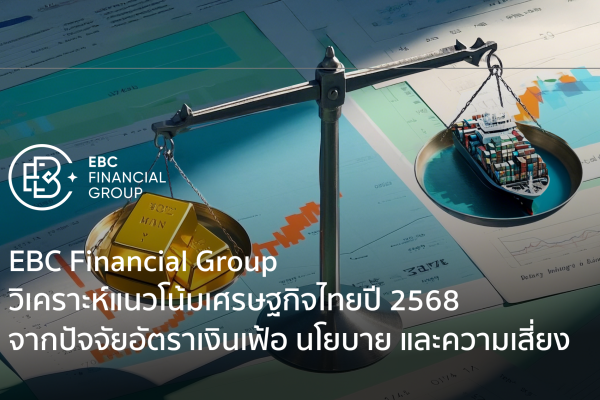เมื่อก้าวเข้าสู่ปี 2568 เศรษฐกิจในไทยยังคงเผชิญกับความท้าทายในด้านมาตรการกระตุ้นเศรษฐกิจ นโยบายการเงิน และความผันผวนของตลาดทั่วโลก แม้ว่าอัตราเงินเฟ้อจะอยู่ในระดับที่ควบคุมได้ แต่การเติบโตทางเศรษฐกิจกลับได้รับผลกระทบจากการส่งออกที่อ่อนแอ ความไม่แน่นอนทางภูมิรัฐศาสตร์ และปัญหาทางโครงสร้าง ซึ่งปัจจัยการฟื้นตัวของเศรษฐกิจยังคงเป็นมาตรการกระตุ้นเศรษฐกิจจากภาครัฐและภาคการท่องเที่ยว EBC Financial Group (EBC) ให้ความสำคัญกับเศรษฐกิจในประเทศ โดยให้ข้อมูลเชิงลึกเกี่ยวกับภูมิทัศน์ทางการเงินที่กำลังเปลี่ยนแปลง พร้อมทั้งเสนอแนวโน้มและโอกาสการลงทุนในปี 2568
อัตราเงินเฟ้อและนโยบายการเงินที่มีผลต่อเศรษฐกิจในช่วงปลายปี
ในปี 2567 อัตราเงินเฟ้อในประเทศไทยต่ำกว่าเป้าหมายของธนาคารแห่งประเทศไทย (ธปท.) ที่ตั้งไว้ระหว่าง 1% ถึง 3% โดยในเดือนธันวาคม ปี 2567 ดัชนีราคาผู้บริโภค (CPI) ขยับขึ้น 1.23% เมื่อเทียบกับปีก่อน ซึ่งเพิ่มขึ้นจาก เดือนพฤศจิกายน 0.95% ซึ่งถือเป็นการกลับเข้าสู่ช่วงเป้าหมายครั้งแรกในรอบ 7 เดือน แม้จะมีการปรับตัวขึ้นในช่วงปลายปี แต่ค่าเฉลี่ยอัตราเงินเฟ้อทั้งปี 2567 ยังคงอยู่ที่ 0.4% ซึ่งเป็นระดับต่ำที่สุดในรอบ 4 ปี
เพื่อรับมือกับภาวะเงินเฟ้อระดับต่ำและความกังวลเกี่ยวกับการเติบโตทางเศรษฐกิจ ธนาคารแห่งประเทศไทย ได้ลดอัตราดอกเบี้ยนโยบายลง 0.25% เหลือ 2.25% ในเดือนตุลาคม 2567 ซึ่งถือเป็นการปรับลดอัตราดอกเบี้ยครั้งแรกตั้งแต่เดือนกันยายน 2566 หลังจากนั้น ได้ตัดสินใจคงอัตราดอกเบี้ยดังกล่าวในเดือนธันวาคม โดยอ้างถึงความไม่แน่นอนทางเศรษฐกิจที่เพิ่มขึ้นและความจำเป็นในการรักษาความยืดหยุ่นทางนโยบายเศรษฐกิจ นอกจากนี้ ธปท. คาดการณ์การเติบโตทางเศรษฐกิจไทยในปี 2568 ที่ 2.9% และคาดว่าอัตราเงินเฟ้อจะอยู่ในช่วงเป้าหมายที่ 1%-3% โดยคาดว่าจะอยู่ที่ 1.1%
นักวิเคราะห์จาก EBC เตือนว่า การปรับลดอัตราดอกเบี้ยอาจมีข้อจำกัดจากความท้าทายเชิงโครงสร้างที่ยังคงมีอยู่ โดยเฉพาะภาคการส่งออกของประเทศไทยยังคงเผชิญปัญหาจากการชะลอตัวของการค้าระหว่างประเทศ ขณะเดียวกันการลงทุนจากภาคเอกชนยังไม่ฟื้นตัว ซึ่งทำให้การกระตุ้นการเติบโตทางเศรษฐกิจในช่วงที่เศรษฐกิจโลกยังคงไม่แน่นอน และเป็นเรื่องที่ท้าทายอย่างมาก
นายพิชัย ชุณหวชิร รัฐมนตรีว่าการกระทรวงการคลัง เปิดเผยถึงความเป็นไปได้ในการปรับลดอัตราดอกเบี้ยเพิ่มเติม พร้อมเน้นย้ำความสำคัญของการร่วมมือระหว่างมาตรการการเงินและการคลังในการฟื้นฟูเศรษฐกิจ ในฐานะที่ประเทศไทยเป็นจุดยุทธศาสตร์ในเอเชีย แต่ตลาดการเงินของไทยยังคงเผชิญความท้าทายจากปัจจัยภายนอก อาทิ การเปลี่ยนแปลงนโยบายของธนาคารกลางสหรัฐฯ และความตึงเครียดทางภูมิรัฐศาสตร์ที่ส่งผลกระทบต่อการค้าระหว่างประเทศ EBC มองว่า ปัจจัยภายในประเทศไทยและแรงกดดันจากภายนอก สร้างทั้งความเสี่ยงและโอกาสสำหรับนักลงทุน เราเน้นย้ำถึงความสำคัญของการตัดสินใจเชิงกลยุทธ์ในการรับมือกับการเปลี่ยนแปลงในตลาด

มาตรการกระตุ้นเศรษฐกิจของภาครัฐฟื้นฟูและภาคการท่องเที่ยว
การฟื้นตัวเศรษฐกิจของประเทศไทยได้รับแรงขับเคลื่อนจากภาคการท่องเที่ยว ในปี 2567 ประเทศไทยมีนักท่องเที่ยวต่างชาติราว 35.5 ล้านคน ซึ่งมีส่วนสำคัญในการกระตุ้นการเติบโตทางเศรษฐกิจ อย่างไรก็ตาม ตลาดหลักทรัพย์แห่งประเทศไทย (SET) ยังคงเผชิญกับความท้าทายอย่างต่อเนื่อง โดยผลการดำเนินงานยังต่ำกว่าตลาดหุ้นในภูมิภาคอื่นๆ ซึ่งเกิดจากความไม่สงบทางการเมืองและความไม่แน่นอนของนโยบายเศรษฐกิจ ความไม่สอดคล้องระหว่างการฟื้นตัวของการท่องเที่ยวและผลประกอบการของตลาดหุ้น สะท้อนถึงความท้าทายทางเศรษฐกิจที่อาจกระทบต่อความเชื่อมั่นของนักลงทุน ซึ่งมองว่าเป็นโอกาสสำหรับการลงทุน
รัฐบาลไทยรับมือกับความท้าท้ายเหล่านี้ โดยดำเนินมาตรการทางการคลังหลายด้าน เช่น โครงการกระตุ้นเศรษฐกิจมูลค่า 490,000 ล้านบาท ที่มุ่งเป้าไปยังประชากรประมาณ 45 ล้านคน การปรับขึ้นค่าแรงขั้นต่ำ 2.9% ซึ่งมีผลตั้งแต่เดือนมกราคม 2568 และมาตรการภาษีที่ให้สิทธิประโยชน์สูงสุดถึง 50,000 บาท เพื่อกระตุ้นการใช้จ่ายในภาคต่าง ๆ EBC ระบุว่า มาตรการเหล่านี้อาจช่วยสนับสนุนธุรกิจในภาคสินค้าอุปโภคบริโภคและการท่องเที่ยว ขณะเดียวกัน โครงสร้างพื้นฐานที่สอดคล้องกับแผนพัฒนาประเทศ อาจเป็นโอกาสการเติบโตสำหรับนักลงทุนระยะยาว ผลสำเร็จของมาตรการเหล่านี้จะขึ้นอยู่กับความสามารถของไทยในการดำเนินการปฏิรูปเชิงโครงสร้างเพื่อสร้างการเติบโตอย่างยั่งยืน
ผลกระทบจากภาษีศุลกากรของสหรัฐฯ ต่อจีนและแนวโน้มเศรษฐกิจของประเทศไทย
หนึ่งในปัจจัยสำคัญที่กำหนดแนวโน้มเศรษฐกิจของประเทศไทยในปี 2568 คือ ความสัมพันธ์ทางการค้าระหว่างสหรัฐฯ และจีนที่กำลังพัฒนาอย่างต่อเนื่อง ภาษีศุลกากรใหม่ของสหรัฐฯ ที่จะมีผลบังคับใช้ในปีนี้ อาจส่งกระทบต่อเศรษฐกิจของจีนและอาจทำให้จีนต้องเพิ่มมาตรการกระตุ้นเศรษฐกิจ หากการใช้จ่ายของผู้บริโภคในจีนยังคงอ่อนแอ การท่องเที่ยวออกนอกประเทศอาจชะลอตัวลง
แม้ว่าจะมีความกังวลเรื่องความปลอดภัยในภาคการท่องเที่ยว แต่ประชาชนจีนยังคงเป็นกลุ่มนักท่องเที่ยวต่างชาติที่เดินทางเข้ามาในประเทศไทยมากที่สุดในปี 2567 ความไม่แน่นอนนี้อาจสนับสนุนให้ทองคำมีบทบาทมากขึ้น เนื่องจากอุตสาหกรรมทองคำยังคงได้รับความนิยมและมีส่วนสำคัญในการขับเคลื่อนเศรษฐกิจของไทย
นักวิเคราะห์จาก EBC แนะนำว่า นักลงทุนควรติดตามสถานการณ์การค้าอย่างใกล้ชิด เนื่องจากสินทรัพย์ทองคำและสินค้าโภคภัณฑ์อื่น ๆ อาจมีบทบาทสำคัญมากขึ้นในกลยุทธ์การบริหารความเสี่ยงของพอร์ตการลงทุน เพื่อตอบสนองต่อความไม่แน่นอนทางเศรษฐกิจโลกที่กำลังเพิ่มสูงขึ้น
EBC พร้อมส่งเสริมการตัดสินใจอย่างมีข้อมูล
EBC Financial Group (EBC) บริษัทที่ให้บริการทางการเงินชั้นนำ ซึ่งมีสำนักงานในศูนย์การเงินสำคัญทั่วโลก พร้อมสนับสนุนนักลงทุน โดยการให้ความรู้ทางการเงิน มอบโอกาสลงทุนใน อัตราแลกเปลี่ยน สินค้าโภคภัณฑ์ หุ้นสหรัฐฯ และดัชนี เป็นต้น EBC มีเป้าหมายที่จะยกระดับความรู้และเตรียมความพร้อมให้กับนักลงทุน เพื่อให้การตัดสินใจลงทุนมีประสิทธิภาพ ในสภาวะเศรษฐกิจผันผวนอย่างเช่น เศรษฐกิจในประเทศไทย
EBC Financial Group Analyzes Thailand’s Economic Outlook 2025 : Inflation, Policy and Risks
– Thailand’s inflation rate eases, but trade risks and policy changes remain a factor to watch
– EBC Financial Group Analyzes Market Trends and Investment Opportunities in 2025
As we enter 2025, the Thai economy continues to face challenges in terms of stimulus measures, monetary policy and global market volatility. Although inflation is under control, economic growth has been impacted by weak exports, geopolitical uncertainty and structural issues. The economic recovery factors remain stimulus measures from the government and the tourism sector. EBC Financial Group (EBC) focuses on the domestic economy, providing insights into the changing financial landscape. Also presenting investment trends and opportunities in 2025
Inflation and monetary policy affecting the economy at the end of the year
In 2024, Thailand’s inflation rate was below the Bank of Thailand’s ( BOT ) target of between 1% and 3%. In December 2024, the Consumer Price Index (CPI) rose 1.23% year-on-year, up from 0.95% in November. This marks the first return to the target range in seven months. Despite an upward adjustment towards the end of the year, the average inflation rate for 2024 remains at 0.4% , the lowest level in four years.
To cope with low inflation and concerns about economic growth The Bank of Thailand cut its policy interest rate by 0.25% to 2.25% in October 2024 , the first rate cut since September 2023. It then decided to hold the rate unchanged in December, citing rising economic uncertainty and the need to maintain policy flexibility. The BOT also projects Thailand’s economic growth in 2025 at 2.9 % , with inflation expected to be in the target range of 1%-3% , with an expected 1.1%.
Analysts at EBC warned that the rate cut could be limited by persistent structural challenges, particularly as Thailand’s export sector continues to struggle due to a slowdown in international trade, while private investment has yet to recover, making it challenging to stimulate economic growth at a time of global economic uncertainty.
Finance Minister Pichai Chunhavajira revealed the possibility of further interest rate cuts and emphasized the importance of cooperation between monetary and fiscal measures in economic recovery. As Thailand is a strategic location in Asia, the Thai financial market still faces challenges from external factors, such as changes in the US Federal Reserve’s policy and geopolitical tensions affecting international trade. EBC believes that domestic factors in Thailand and external pressures create both risks and opportunities for investors. We emphasize the importance of strategic decision-making in dealing with changes in the market.
The government’s economic stimulus measures to restore and rehabilitate the tourism sector
Thailand’s economic recovery is driven by the tourism sector. In 2024, Thailand received approximately 35.5 million international tourist arrivals, which significantly contributed to economic growth. However, the Stock Exchange of Thailand (SET) continues to face challenges, with its performance underperforming other regional stock markets due to political unrest and economic policy uncertainty. The mismatch between tourism recovery and stock market performance reflects economic challenges that may weigh on investor confidence, which is seen as an opportunity for investment.
The Thai government is addressing these challenges with a number of fiscal measures, including a 490 billion baht stimulus package targeting around 45 million people, a 2.9% minimum wage hike effective January 2025 , and a tax incentive of up to 50,000 baht to boost spending across sectors. EBC said these measures could support businesses in the consumer goods and tourism sectors, while infrastructure in line with the national development plan could provide growth opportunities for long-term investors. The success of these measures will depend on Thailand’s ability to implement structural reforms to create sustainable growth.
The Impact of US Tariffs on China and Thailand’s Economic Outlook
One of the key factors determining Thailand’s economic outlook in 2025 is the evolving trade relationship between the United States and China. New US tariffs set to take effect this year could hurt China’s economy and may force it to step up stimulus measures. If consumer spending in China remains weak, outbound tourism could slow down.
Despite safety concerns in the tourism sector, Chinese nationals will remain the largest group of international tourists visiting Thailand in 2024. This uncertainty could support a greater role for gold as the gold industry remains popular and a key driver of Thailand’s economy.
Analysts at EBC recommend that investors keep a close eye on the trade situation, as gold and other commodities could play an increasingly important role in portfolio risk management strategies in response to rising global economic uncertainty.
EBC is committed to promoting informed decision-making.
EBC Financial Group (EBC), a leading financial services company with offices in major financial centers around the world, supports investors by providing financial education and investment opportunities in foreign exchange, commodities, US stocks and indices, etc. EBC aims to enhance the knowledge and prepare investors to make effective investment decisions in volatile economic conditions such as the one in Thailand.




